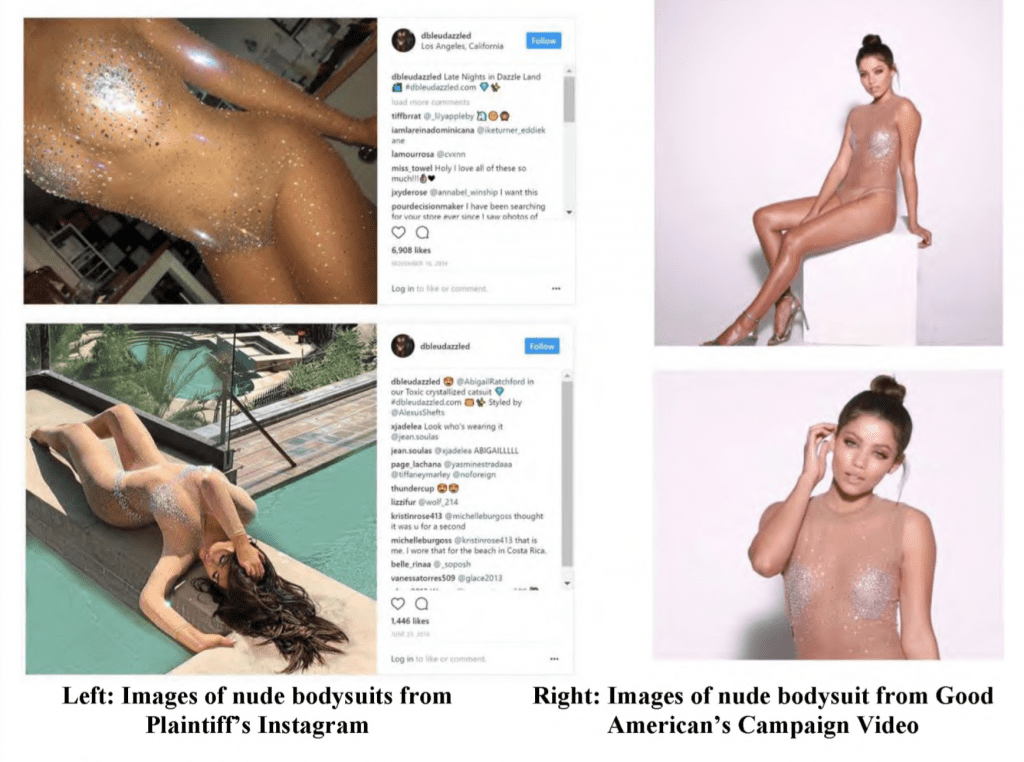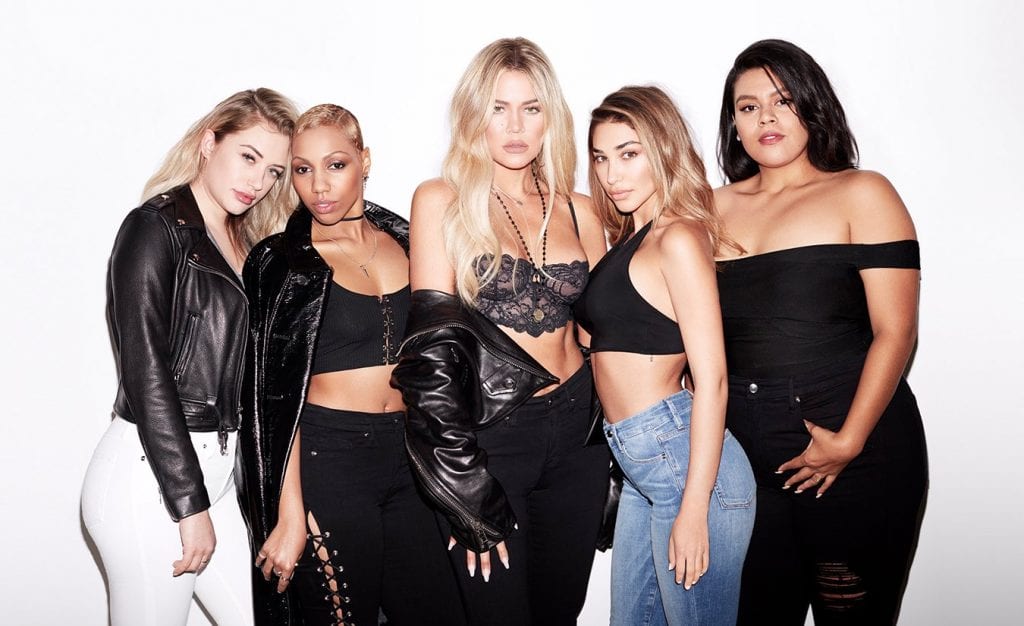Almost exactly three years after Khloe Kardashian was first called out for allegedly copying the designs of Destiney Bleu Lewis and d.bleu.dazzled, the indie fashion brand has filed suit against Kardashian and Good American, the denim-centric label that she founded in 2016 alongside co-CEO Emma Grede, alleging that the reality star copied garments originally produced by her “small and independent women’s clothing company” and then sold them under the Good American name “without acknowledging [d.bleu.dazzled] or properly compensating [d.bleu.dazzled] for the designs.”
According to the common law trade dress infringement, misappropriation, fraud and deceit, and unfair competition complaint that it filed in a California state court on May 29, Los Angeles-based d.bleu.dazzled claims that between 2016 and 2017, Kardashian – by way of her team – “purchased and borrowed numerous pieces of [d.bleu.dazzled] clothing, under the false pretense that the clothing items were for [the 35-year old star’s] personal use.” The problem? Instead of actually wearing the garments, as her team had led d.bleu.dazzled to believe would happen, Kardashian allegedly copied them for the clothing brand that she was secretly working on at the time.
“In or around June 2016, Kardashian and Good American decided to create a line of women’s bodysuits,” d.bleu.dazzled asserts. In lieu “of creating their own bodysuit designs, however, Kardashian and Good American decided it would be easier to knock off the proven designs of d.bleu.dazzled,” which, since it was founded in 2011, has garnered a growing pool of famous fans, including “A-list celebrities,” such as Beyoncé, Serena Williams, Lady Gaga, Taylor Swift, Rihanna, and even Kardashian sister Kylie Jenner, among many others.
“From November 2016 through May 2017, Kardashian, through her assistants, repeatedly contacted Ms. Lewis and others at d.bleu.dazzled to order at least sixteen made-to-measure garments,” the brand asserts. “At no time did [Kardashian or Good American] disclose to anyone at d.bleu.dazzled that [they] were planning to create their own clothing line with similar designs.” In fact, “Had Ms. Lewis been advised of [their]secret intent to steal her designs, she would not have sold or lent any garments to them.”
Fast forward to June 2017, and d.bleu.dazzled claims that Kardashian launched her Good American label, complete with “bodysuits bearing [a] striking resemblance to d.bleu.dazzled’s signature [offerings],” which consist of nude and black bodysuits embellished with crystals.
“After Ms. Lewis and numerous members of the public pointed out the blatant copying [by Good American], rather than properly acknowledge and compensate Ms. Lewis for the designs,” d.bleu.dazzled claims that Kardashian and Good American responded by “sending a cease and desist letter in an attempt to silence Ms. Lewis,” which appeared to work, as Lewis and d.bleu.dazzled’s public fight against Kardashian and her brand did not develop any further … until now.

With such “misappropriation and infringement” in mind, d.bleu.dazzled claims in the newly-initiated case that it has “no choice” but to file suit “seeking damages that it has suffered” as a result of Kardashian and Good American’s conduct.
As for what exactly d.bleu.dazzled claims it has trade dress rights in, the company characterizes its trade dress as “a unique design and careful placement of crystal rhinestones on intimate garments made of form-fitting materials (such as Spandex, Lycra, and nylon) with a sheer or semi-opaque look (such as mesh, micro-mesh, lace, and fishnets).”
A subset of trademark law, trade dress provides protection for the overall image of a product, such as the color, shape, size, and/or configuration, as long as the features of the product and/or its design has the same source-identifying function as a traditional trademark, such as a logo or word mark. It is worth noting (as there will inevitably be questions about originality) that unlike copyright and patent law, which respectively require originality and novelty in order for protections to exist, trademark (and trade dress) law does not impose such a standard. Instead, the core requirement in terms of amassing trademark rights in the U.S. is being the first to use a mark as a mark (i.e., as an indicator of source) in commerce. In the case of trade dress, which is what d.bleu.dazzled asserts here, a party needs to be the first to use a product configuration or design in commerce as an indicator of source in order to have priority and potentially gain rights.
As such, while others have certainly made use of embellished bodysuits in the past, d.bleu.dazzled may be able to make an argument that prior uses were decorative in nature (and thus, did not amount to trademark use), and that its use of the embellishments on the bodysuits is more than that, as it serves as an indictor if its brand since such products are what it has become known for among consumers.
D.bleu.dazzled will need to prove the latter bit – that consumers have some to associate the embellished bodysuits with a single source – which it can do by presenting consumer surveys showing that actual consumer associate the trade dress with a particular source; advertising expenditures by the rights holder in connection with the trade dress-bearing product;, unsolicited media coverage of the specific trade dress-bearing product; worldwide sales for the trade dress-bearing product; the length, degree, and exclusivity of use of the trade dress; and attempts by others to copy the trade dress. This is precisely what the brand is alluding to when it asserts that due to “its widespread use and promotion [of designs bearing such a design],” as well as the adoption for he designs by a whole host of celebrities, paired with the fact that designs featuring the trade dress have been “featured on numerous award shows and TV and movie programs, including the Grammys, Oscars, Super Bowl, BET Awards, Billboard Awards, and the Met Gala,” as well as in “Sports Illustrated, Vogue, Harper’s Bazaar, and Elle,” it has “achieved common law rights in its trade dress in connection with women’s garments.”
In short: as a result of such widespread media attention to and adoption of its bodysuits by big name celebrities, “consumers and potential consumers have come to associate the d.bleu.dazzled distinctive bodysuits with the d.bleu.dazz3led brand.”
As a result of such alleged trade dress infringement, as well as deceit and fraud (namely, stemming from their “duty to disclose material facts to [d.bleu.dazzled] because, in the transactions and dealings between the parties, the defendants knew that the fact they intended to develop competing bodysuits was known or accessible only to the defendants, and they knew that fact was not known or reasonably discoverable by [d.bleu.dazzled]),” d.bleu.dazzled is seeking injunctive relief to prevent Kardashian and Good American from further infringing its trade dress, and monetary damages of no less than $10 million.
While Kardashian and Good American have not yet formally responded to d.bleu.dazzled’s complaint, assuming they do not quickly and quietly settle the case, their legal team will inevitably push back against the common law trade dress infringement claims by way of an argument that d.bleu.dazzled lacks valid trade dress rights in the “nude and black micro-mesh bodysuits and catsuits that feature scattered crystals throughout the garment with concentrated burst patterns covering the bust area.”
To be specific, they will likely assert that the body suit embellishment trade dress lacks secondary meaning (as required for protection), and/or that the embellishments, themselves, do not function as source indicators (and thus, trademarks), and instead, serve a decorative function, thereby, extinguishing any potential trade dress rights in the design.
*The case is dbleudazzled, LLC v. Khloe Kardashian and Good American, LLC, 20STCV20510 (Cal.Sup.).











